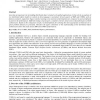Free Online Productivity Tools
i2Speak
i2Symbol
i2OCR
iTex2Img
iWeb2Print
iWeb2Shot
i2Type
iPdf2Split
iPdf2Merge
i2Bopomofo
i2Arabic
i2Style
i2Image
i2PDF
iLatex2Rtf
Sci2ools
125
click to vote
SIGPLAN
1998
1998
Java and Distributed Object Models: An Analysis
Java has an important role in building distributed object oriented web enabled applications. In the article an analysis of two distributed object models in context of Java language is presented. Several aspects of RMI and CORBA such as features, maturity, support for legacy systems, learning curve and ease of development are compared. A special emphasis is given to the performances. Different testing scenarios give a complete overview about real world performances of both architectures. Based on the comparison results, recommendations for selecting the most appropriate architecture for a given problem domain are presented. Therefore the paper contributes to the understanding of the distributed object architectures and to the study of Java RMI and CORBA performances. Key words: Java, CORBA, RMI, distributed objects, performances
Related Content
| Added | 23 Dec 2010 |
| Updated | 23 Dec 2010 |
| Type | Journal |
| Year | 1998 |
| Where | SIGPLAN |
| Authors | Marjan Hericko, Matjaz B. Juric, Ales Zivkovic, Ivan Rozman, Tomaz Domajnko, Marjan Krisper |
Comments (0)

